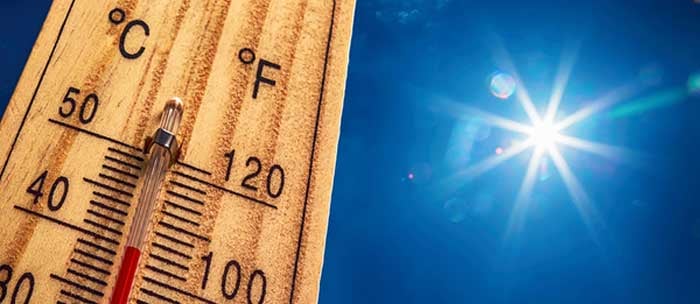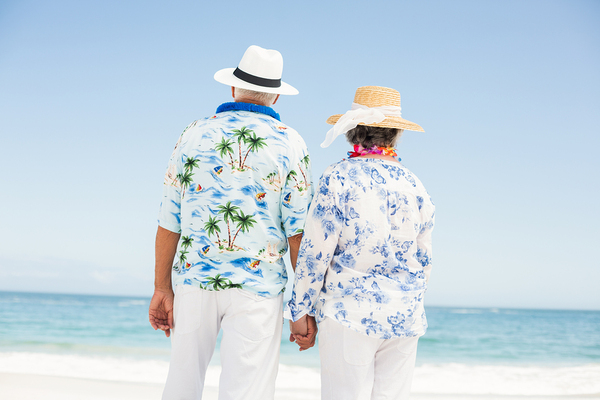 Summer is definitely upon us! And while warm sunshine -- and the vitamin D it brings along with it -- has its upsides, caregivers must also remain aware of one critical fact: When temperatures soar, so do threats to senior health and wellness.
Summer is definitely upon us! And while warm sunshine -- and the vitamin D it brings along with it -- has its upsides, caregivers must also remain aware of one critical fact: When temperatures soar, so do threats to senior health and wellness.
Here’s a closer look at why summertime can be dangerous for seniors, along with caregiver tips aimed at keeping seniors safe in the summer heat.
Why Are Seniors So Susceptible to Heat?
We often talk about the dangers of extreme cold on seniors. And indeed, freezing temperatures can lead to dangerous consequences for seniors -- a reality that was brought to public attention earlier this year when two nonagenarian twin sisters in Rhode Island died after being stranded outside in the frigid weather.
But the reality is that extreme heat can be just as dangerous. In fact, hundreds of people die every year when the mercury rises. In a CDC press release, acting director of the National Center for Environmental Health and Agency for Toxic Substances and Disease Registry Robin Ikeda said,
“No one should die from a heat wave, but every year on average, extreme heat causes 658 deaths in the United States—more than tornadoes, hurricanes, floods, and lightning combined.”
And which demographic experiences the largest number of heat-related fatalities? Seniors.
Says the CDC,
“Extreme heat can lead to very high body temperatures, brain and organ damage, and even death. People suffer heat-related illness when their bodies are unable to compensate and cool themselves properly. Extreme heat affects everyone, but the elderly, children, the poor or homeless, persons who work or exercise outdoors, and those with chronic medical conditions are most at risk.”
There are a number of reasons why seniors are so susceptible to the dangers of high temperatures. For starters, older bodies simply can’t take the heat as well as younger ones due to a combination of poor circulation and less effective sweating. Furthermore, certain chronic medical conditions, including diabetes, dementia, heart disease and obesity, can increase the risk of heat-related illness, as can certain medications, including those prescribed for everything from Parkinson’s disease to hypertension.
Signs and Symptoms of Heat-Related Illness
Muscle cramping is usually one of the early indications of heat-related illness, according to the CDC. Without intervention, heat exhaustion and heat stroke may ensue.
If you notice that a senior in your care is experiencing heavy sweating; weakness; cold, pale, and clammy skin; a fast, weak pulse; nausea or vomiting; or fainting, he may be suffering from heat exhaustion. Immediately relocate him to a cooler location, encourage him to lie down, loosen his clothing, and apply cool wet cloths to his body. Sipping water can also help alleviate symptoms.
If symptoms continue, and/or if your aging loved one vomits; his temperature rises to about 103 degrees Fahrenheit; his pulse is rapid and strong; his skin is hot, red, dry and moist; or an altered mental state or unconsciousness occurs, he may be suffering from heat stroke, which is a medical emergency. Call 911 immediately, then take the steps listed above while you wait for help.
Helping Seniors Beat the Heat
The good news, according to Ethel Taylor, lead author of a CDC study published in its journal Morbidity and Mortality Weekly Report?
“Heat-related illnesses and deaths are preventable. Taking steps to stay cool, hydrated and informed in extreme temperatures can prevent serious health effects like heat exhaustion and heat stroke.”

Caregivers can also help seniors stay cool during hot water with the following tips:
- Encourage seniors to drink plenty of liquids -- eight or more eight ounces glasses of water or fruit juice a day. Don’t wait until they’re thirsty to offer drinks. Also limit caffeinated and alcoholic beverages, as this can lead to dehydration.
- Help seniors dress appropriately in loose-fitting, light-colored clothes in natural fabrics like cotton which reflect the sun. Hats, sunglasses, and sunscreen of 30+ SPF offer additional protection when outdoors.
- Keep seniors inside during extreme heat spells. If air conditioning is not available in the living space, go somewhere with air conditioning, like a community center, movie theater or friend’s house. Do not rely on a fan alone for cooling.
- If seniors are housebound during a heatwave, avoid using the stove and oven during this time to keep the home from further heating up. Cool baths and showers can help their lower body temperatures.
One last thing to keep in mind. Because older people are less likely to notice and respond to changes in temperature, caregivers play a particularly vital role in safeguarding their health and wellness. Close monitoring can ensure a prompt and potentially life-saving response in the event of a heat-related illness.
If you're looking for a comprehensive resource for family caregivers, check out our online Family Caregiver Guide.mmLearn.org offers a large library of free videos for caregivers of older adults, covering topics pertaining to senior care. Whether you are a healthcare professional or a family caregiver, if you are caring for an older adult we know that you will find mmLearn.org an essential guidance tool for all of your caregiver training needs. Access our database of free caregiver training videos to start learning today.

